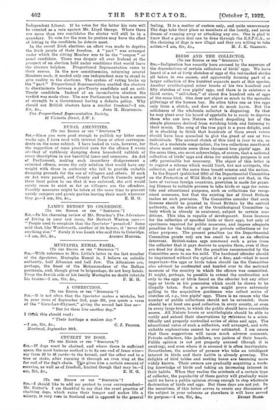BIRDS AND THE COLLECTOR.
[To THE EDITOR OF THE " SPECTATOR."3 Sin,—Indignation has recently been aroused by the exposure of the depredations of certain collectors of birds' eggs. We have heard of a set of forty clutches of eggs of the red-backed shrike all taken in one season, and apparently forming part of a, larger collection of five hundred separate nests of this species. Another ornithological miser boasts of his two hundred and fifty clutches of tree pipits' eggs, and there is in existence a • third series, "self-taken," of about five hundred sets of eggs of the same bird. One does not object so much to the sporadic pilferings of the human boy. He often takes one or two eggs only from a clutch, and does not do much harm. But the selfishness of the wholesale collector is disgusting: So that he may gloat over his hoard of eggshells he is ready to deprive those who can love Nature without despoiling her of the simple pleasures derived from watching birds and listening- to their music. The song of the tree pipit is a pure delight, and it is shocking to think that hundreds of these sweet voices should have been quenched to glut the greed of one or two individuals. The normal clutch of this bird is four to six, so that, at a moderate computation, the two.collections mentioned above must contain some three thousand tree pipits' eggs. At the same time, one must acknowledge, of course, that a national collection of birds' eggs and skins for scientific purposes is not only permissible but necessary. The object of this letter is to suggest a scheme which would limit, but not extirpate, the collector, and at the same time benefit science and the nation. In the Report (published 1919) of the Departmental Committee on the Protection of Wild Birds it is pointed out that, in the laws of various foreign countries, provision is made for grant- ing licences to suitable persons to take birds or eggs for scien- tific and educational purposes, such as collections for recog- nized museums, but that the existing law ef Great Britain makes no such provision. The Committee consider that such licences should be granted in Great Britain by the central- authority, on the advice of the Ornithological Committee (a body which is already in existence), subject to certain con- ditions. This idea is capable of development. Issue licences for the collection of specified birds or their eggs, but only of specimens required for public museums, and impose adequate penalties for the taking of eggs for private collections or for other purposes. The present penalties (as the Departmental Committee points out) are too small to act as an effective deterrent. British-taken eggs. command such a price from the collector that it pays dealers to acquire them, even if they are fined for doing so. But the penalties recommended by the Committee seem to me too mild. The hardened offender should be imprisoned without the option of a fine; and—what is most important—the eggs or bird's taken should (as the Committee also advises) be confiscated and handed over to the national museum of the ()Gantry in which the offence was- committed. It might, perhaps, be possible to extend the confiscation not only to the eggs or birds found on the offender but any other eggs or birds in his possession which could be shown to be illegally taken. Such a provision might prove extremely galling to the acquisitive gentlemen who collect series of clutches of, e.g., tree pipits' eggs. There is no reason why the number of public collections should not be extended; there should be at least one good collection in every county, or even in every large town, to which the public should have reasonable access. All Nature lovers or ornithologists should be able to verify and extend their observations by-reference to a scien- tifically and properly controlled' series of skins and eggs. The educational value of such a collection, well arranged, and with suitable explanations cannot be over estimated. I am aware that these suggestions will cause much adverse comment. Private collectors, like jackdaws, are jealous of their hoards. Public opinion is not yet properly aroused (though it is awaking), and even where it is aroused it is often inarticulate. Nevertheless, the number of persons who take an intelligent interest in birds and their habits is already growing. The delights of bird tables and nesting boxes are becoming more widely known. Their owners are gradually acquiring a work- ing knowledge of birds and taking an increasing interest in their habits. When they realize the misdeeds of a certain type of collector, the popularity of these gentry will gradually wane until we have a public opinion strong enough to stop wholesale destruction of birds and eggs. But these days are not yet. In the meantime, if this letter serves to create any discussion of the 'subject in your columns or elsewhere it will have served






































 Previous page
Previous page